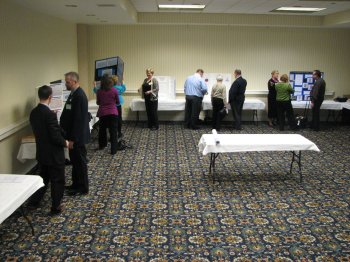 The poster session is an excellent opportunity for workshop attendees to discover
many things, as it allows you to learn what the current burning questions in music
education are, and what we know about these topics. Opportunities to speak with the
researchers can tell you not only about the project in hand, but also about what music
educators know about many diverse topics. This session is one in which people can
drop in and stay for a few minutes to talk with one person who may well have
interesting information, or stay for the entire hour and glean informed views from many
participants regarding all manner of topics. We usually see about 200 people come
through this event. This year, we hope even more people will come by to take
advantage of this dynamic learning opportunity as we look at this greatly increased
presentation venue.
The poster session is an excellent opportunity for workshop attendees to discover
many things, as it allows you to learn what the current burning questions in music
education are, and what we know about these topics. Opportunities to speak with the
researchers can tell you not only about the project in hand, but also about what music
educators know about many diverse topics. This session is one in which people can
drop in and stay for a few minutes to talk with one person who may well have
interesting information, or stay for the entire hour and glean informed views from many
participants regarding all manner of topics. We usually see about 200 people come
through this event. This year, we hope even more people will come by to take
advantage of this dynamic learning opportunity as we look at this greatly increased
presentation venue.
2016 General Research Session
The general research session will include three presentations of recent research in music education and the psychology of music. As in all years, the research arm of KMEA seeks to identify and include research from the very best the state has to offer. This year's presenters feature three engaging presentations that I am sure will inform and excite. The first presentation features Debra Brown discussing The Instrumentalist as Children's Chorus Director in the Public School Setting. The purpose of this study was to examine the unique experience of instrumentalist musicians directing a children's chorus as part of his/her general music position in suburban public schools. In this qualitative study, four teacher's experiences were explore detailing their training, self-reflection on chorus directing as well as differences in their experience as a director. The four participants represented four different elementary schools in two large suburban districts in the same Midwestern metropolitan area. Each engaged in two interviews of thirty to forty-five minutes in length. Two had less than four years of experience, the other two had more than eight years of experience. Between the interviews, all were observed twice directing their children's chorus rehearsals. Themes emerged that showed strengths in areas of teaching breath control, phrasing, artistic expression and note reading. Choral teaching weaknesses or insecurities identified by newer teachers included choral style, vocal production, literature choice, and diction. From the data, it appeared that the more experience the teacher acquired, the greater the confidence in working with the child voice in a chorus.
The second presentation in this session will feature Jenna McGovern who will discuss a study wherein she examined the differences between spoken and musical transitions in an inclusive early childhood classroom. The participants (n=17) attended an inclusive preschool program with students with visual impairments. Five different transitional times were identified during the weekly 25-minute music class to examine whether spoken or sung directives were more effective during classroom transition periods. To determine the effectiveness of the transitions, the researcher investigated the duration of transitions and the number of students off-task during each transition. Data indicated that musical transitions decreased the amount of time spent in transition particularly when entering the music classroom.
The final in this session will feature Rebecca Tast who will discuss a project entitled: A Comparison of Three Pedagogical Methods for Setting Cello Endpin Length. The purpose of this two-part study was to compare the endpin lengths and the resulting cello setups produced by the Scroll to Nose Method, the Hand Span Method, and the Drop Method, and to determine if factors such as height or sex play a role in determining endpin length. The purpose of part one of this study was to compare the endpin lengths produced by three different pedagogical methods. Participants for part one of this study (N=62) consisted of adult, volunteer students and faculty. Results from part one suggested that the endpin lengths produced by the Scroll to Nose Method and the Hand Span Method and the Drop Method and the Hand Span Method differ significantly. Results from part one also demonstrated a statistically significant interaction between pedagogical method and height, but not between pedagogical method and sex. The purpose of part two of this study was to compare the cello setups that resulted from the use of the three pedagogical methods. Participants (N=93) were given a survey and instructed to select the pair of pictures that showed the best cello setup. Participant's survey responses indicated an even split in the overall choice of the Scroll to Nose Method and the Drop Method.
The general research session this year will be on Friday, February 26 from 12:55-1:45 PM in Room 205 of Century II.
As always, we will have abstracts for the general research session available at the door to the session. We hope you will come by, look at the talks to be presented, and come on in to see how the newest knowledge in our profession can make your classroom a more effective experience for your students.
